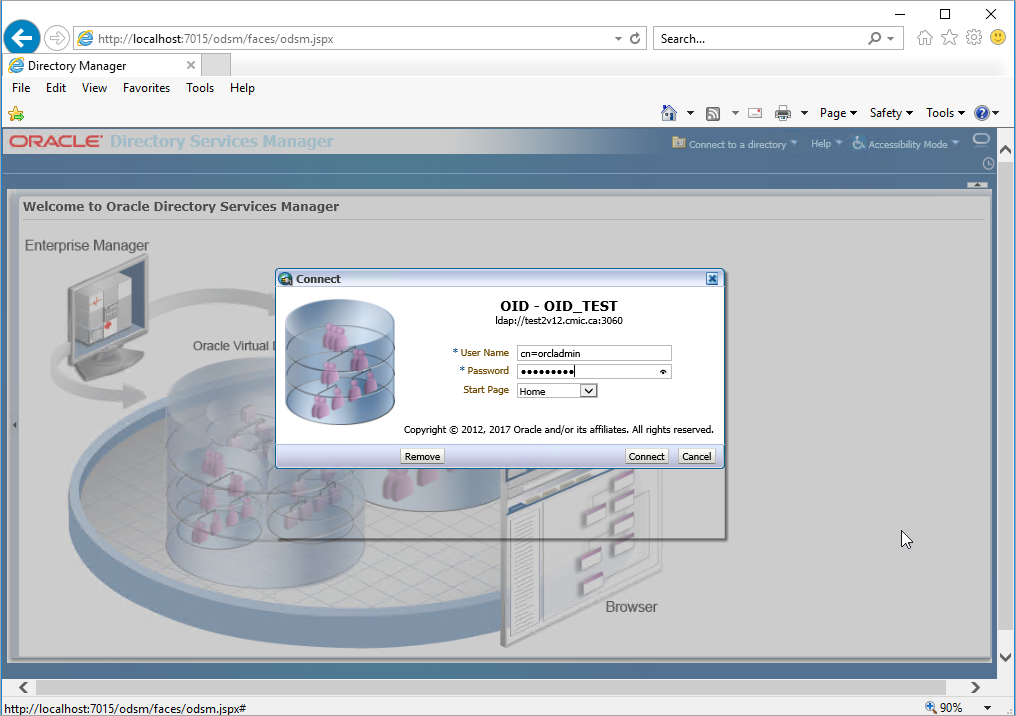System Administration - Technical DBA Functions
DBDEFINE.sql
The file DBDEFINE.sql contains all the usernames, passwords, and links required when performing installations or applying patches. If this file is defined incorrectly the patchinstall program will most likely fail.
If security is an issue, this file can be edited to add and remove the passwords before and after each patch install process.
There is one copy of dbdefine.sql in every environment, on each server. The file is found in D:\cm\V10\<env>\jspsql on each application server.
All of the values must be correct for every environment.
The values that change in each environment are daPass, sysPass1, daDB, daLinkName, daRunTimePass, owkfPass, and owkfLinkName. It is important to make sure that these values are correct in each environment.
The other entries should always be set to the values shown below in blue.
|
define daSchema |
always should be set to da |
|
define daPass |
DA's password in the current environment's database |
|
define JssSchema |
always should be set to js63 |
|
define JssPass |
Js63’s password in the current environment's database |
|
define UIGSchema |
always should be set to uig |
|
define UIGPass |
uig’s password in the current environment's database |
|
define sysUser1 |
always should be set to sys |
|
define sysPass1 |
sys's password in the current environment's database |
|
define daDB |
the name of the database used in the current environment |
|
define daLinkSchema |
always should be set to dalink |
|
define daLinkPass |
always should be set to dalink |
|
define daLinkName |
always should be the same value as daDB |
|
define daLinkTbsp |
always should be set to users |
|
define daLinkTemp |
always should be set to temp |
|
define daRunTimeSchema |
always should be set to dar |
|
define daRunTimePass |
dar's password in the current environment's database |
|
define daRunTimeTbsp |
always should be set to users |
|
define daRunTimeTemp |
always should be set to temp |
|
define owkfSchema |
always should be set to owf_mgr |
|
define owkfPass |
owf_mgr's password in the current environment's database |
|
define owkfLinkName |
always should be the same value as daDB |
Issue Installation
For JSP deployment files installation, instructions are received from SHIP like the following:
Instructions for manual installation of package 20.00001_CLIENTID.zip
---------- (1) Updating of environment section START ------------
Unzip the package 20.00001_CLIENTID.zip to temporary folder
---------
Copy the following file(s) from unzipped folder 20.00001\jsp to "jsp" folder of environment
---------
PmProjContact.ear
---------- (1) Updating of environment section END ------------
---------- (3) Deployment section START ------------
There are files for deployment in this package from jsp subfolder:
PmProjContact.ear
Copy the following files to "deploy" folder of correspondent domain and run deployment utility
---------- (3) Deployment section END ------------For example, to install in TEST environment, do the following:
-
Unzip 20.00001_CLIENTID.zip and copy PmProjContact.ear file to D:\cm\v12\test\jsp folder and D:\cm\ias\j2ee\test\deployment\deploy folder.
-
Run deployment:
D:\cm\ias\j2ee\test\deployment\bin\cmictest_deploy.cmd
For SQL scripts files installation, instructions are received from SHIP like the following:
Instructions for manual installation of package 20.00002_CLIENTID.zip
---------- (1) Updating of environment section START ------------
Unzip the package 20.00002_CLIENTID.zip to temporary folder
---------
Copy the following file(s) from unzipped folder 20.00002\sql to "sql" folder of environment
---------
20.00002_2.sql
jccfcast.pb
---------- (1) Updating of environment section END ------------
---------- (2) SQL scripts Installation section START ------------
Run as DA user the script 20.00002_2.sql from subfolder sql of environment
---------- (2) SQL scripts Installation section END ------------For example, to install in TEST environment, do the following:
-
Unzip 20.00002_CLIENTID.zip file and copy 20.00002_2.sql, jccfcast.pb to d:\cm\v12\test\sql folder.
-
Go to D:\cm\v12\test\sql folder, open the Command Prompt window as an administrator, then login to TEST database as DA user and run the 20.00002_2.sql script.
Copycd d:\cm\v12\test\sql
setsqlpath
sqlplus da/password@test
SQL>@dbdefine
SQL>@20.00002_2.sql
ODSM Issues
Login to ODSM, as shown in the following screenshot:
